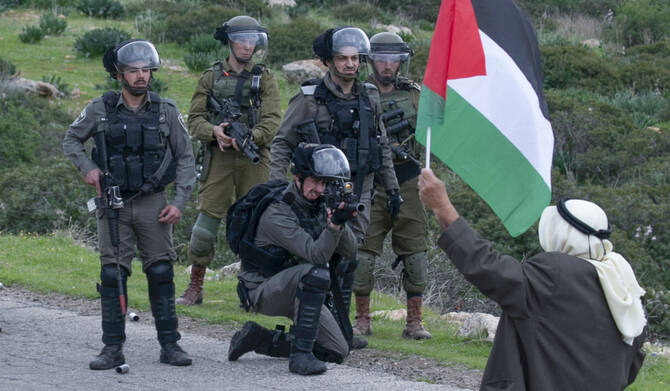JERUSALEM: US President Donald Trump’s return to power has emboldened Israeli leaders’ push to increase military presence in Gaza and reinvigorated right-wing ambitions to annex the occupied West Bank, experts say.
After a phone call Tuesday with Israel’s Prime Minister Benjamin Netanyahu, Trump said on social media: “We are on the same side of every issue.”
In Gaza, where the war sparked by Hamas’s October 7, 2023 attack on Israel has raged for more than 18 months, Trump’s comeback meant “big changes” for Israel, said Asher Fredman, director of Israeli think-tank Misgav Institute for National Security and Zionist Strategy.
“The arms embargo imposed by (former President Joe) Biden’s administration has essentially been lifted,” Fredman said.
“That, together with the fact the northern front (Lebanon and Syria) now is quiet and we have a new defense minister and a new (army) chief of staff, is allowing Israel to move forward in achieving its military goals in Gaza.”
Fredman said Trump has a good grasp of the situation in Gaza and understands Israel’s fight against Hamas.
“If Israel decides to stop the war and have a ceasefire with Hamas, he’ll support it... but he also listened closely to released hostages who told him how terrible Hamas treated them, and his instinct is to get rid of Hamas,” Fredman said.
Trump has made clear statements on Gaza, demanding the release of Israeli hostages and making plans for the territory, but he has remained silent on Israeli actions in the occupied West Bank, which have escalated since the war in Gaza began.
Just days after taking office, Trump proposed removing Gaza’s 2.4 million Palestinian residents to Jordan or Egypt, drawing international outrage.
Although he has since appeared to backtrack, the remarks emboldened Netanyahu and Israeli far-right ministers who continue to advocate implementing the plan.
Analysts say Trump’s silence on the West Bank has encouraged hard-line ministers who openly dream of annexing the territory, which Israel has occupied since 1967 and Palestinians see as part of their future state.
In March, Israel’s cabinet approved the construction of a road project near the Maale Adumim settlement that would separate traffic for Israelis and Palestinians, a move Israeli NGO Peace Now likened to “apartheid.”
Shortly afterward, in a joint statement, Defense Minister Israel Katz and Finance Minister Bezalel Smotrich described Palestinian construction in the West Bank as a “strategic threat to the settlements.”
Smotrich, calling the area by its biblical name, hailed a record year for “demolishing illegal Arab construction in Judea and Samaria” and said the government was working to expand Israeli settlements — which are illegal under international law.
“Since Trump’s election in November, we’ve started to hear more and more rhetoric about annexation in the West Bank, and seen more and more actions on the ground,” said Mairav Zonszein, an analyst from the International Crisis Group.
It is a “combination of Trump’s specific approach and the people that he’s chosen to be around him that have led Smotrich, Katz and others in the Israeli right to be confident that they can move forward with annexation,” she told AFP, mentioning for example the new US ambassador to Israel, Mike Huckabee, who has openly backed Israeli settlements.
Sanam Vakil of Chatham House said that while Trump “has said he wants to end conflicts, there’s not one plan underway. I think there’s maybe multiple conflicting agendas.”
“There’s no criticism, there’s no condemnation of Israel’s activities, and I think that gives it free rein and confidence to continue its expansionist agenda” in the West Bank, Vakil said.
On Gaza, Vakil said Trump was “giving Netanyahu and his hard-liners a very long runway to get the job done.”
Israel says it now controls 30 percent of Gaza’s territory, while AFP’s calculations based on maps provided by the military, suggests it controls more than 50 percent.
While Trump and his administration have openly supported many of Israel’s policies, particularly regarding the Palestinians, sharp differences are emerging on another key issue, Iran.
Vakil said that by being flexible on the Palestinian issue, Trump was likely “trying to buy himself some room to manage the Iran file.”
The Trump administration has been engaged in indirect talks with Israel’s arch-foe Iran on its nuclear program, a clear departure from Netanyahu’s long-standing policy, calling to address the threat through military means.
“The president is making it clear that the military strategy isn’t going to be the first way to address the Iran crisis,” Vakil said, adding this has Israelis deeply worried.
On Saturday, Netanyahu appeared to push back against Trump’s diplomatic initiative, saying in a statement that he remained “committed to preventing Iran from obtaining nuclear weapons.”














